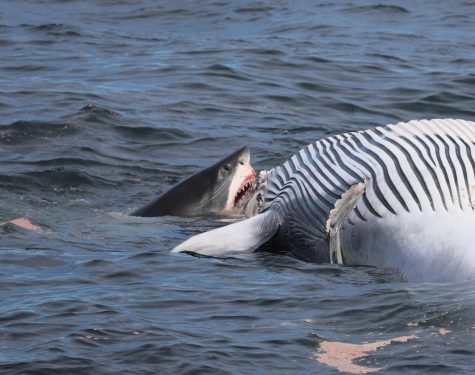The “Jawsobski” Effect
December 12, 2018
Cape Cod has become the summer home to a growing population of white sharks—80 were identified in 2014, 141 in 2015, and 147 in 2016, according to Bostonia magazine. In response to the burgeoning population and recent bites of swimmers, including one fatal, more beachgoers are afraid to go in the water.
“Sharks notoriously have a bad reputation,” said science teacher Joanne Jarzobski, who teaches a new course titled sharks and predators, “this roots from their portrayal in Jaws.” Jaws was released in 1975 and in its wake came a wave of paranoia and phobia of sharks. Scientists, teachers, and members of the Cape Cod community are working diligently to counter this trepidation.
“We need to get the community aware of what’s going on so we don’t have this crazy fear that comes from the media,” said John King from Atlantic White Shark and Wild Cape Cod. Education and knowledge is a major step to assuage misperceptions of sharks. “There are a lot of myths about sharks; it’s important to teach the facts,” said Jarzobski.
King spoke to Jarzobski’s class on Nov. 28 in attempt to inform youth of his shark work and the controversy that directly affects our community. King has travelled the world to pursue his passion and photograph sharks and other marine life in the wild. He is the boat captain for tagging and photo ID work with Dr. Greg Skomal and John Chrisholm at the Division of Marine Fisheries.
There are myriad perspectives and opinions on how to handle the rapidly expanding shark population on Cape Cod as well as worldwide. “Some feel we should let nature be, others say we should cull sharks or seals, and some want barriers at the beaches,” said Jarzobski. However, these are just a few viewpoints on the shark debate. “We are in a period of transition where we are determining what we can do and what will work on Cape Cod,” she added.
King refers to this period of change and growth of the shark population as the “rewilding of Cape Cod.” King is a lifelong Cape Codder; he grew up on the water sailing and fishing but claims that “Cape Cod now is not the same Cape Cod I grew up in.”
Growing up in the 60s King described how it was very rare to see seals along our coasts therefore the presence of sharks was not a major worry when in the water. In 1974 there were only 15 seals off Nantucket Island.“Now there are over 20,000 seals along our coast,” said King, “ and where there are seals there are most likely sharks following them.” It has taken over 50 years for the seal population to resurface. Shark and seal sightings at local beaches have caused people to refrain from going in the ocean. 70 percent of people do not swim when they go to the beach, he said.
Senior Aidan Wilcox has been surfing since he was 12 years old in Rhode Island and the outer Cape. “The growing population of sharks on Cape Cod used to be in the back of my head every time I was surfing,” said Wilcox, “I tried not to worry until the man boogie boarding had died at the end of the summer.”
In response to the growing dangers of surfing on Cape, Wilcox started surfing in Newport with friends every weekend where there are no sharks “Surfing means alot to me, I love being in the ocean,” said Wilcox, “surfing is the best way to enjoy it.” Wilcox has to be more cautious and aware when surfing but sharks have not deterred him from his passion.
Jarzobski has always been interested in sharks and marine life. She majored in biology with a specialization in marine science at Boston University. Jarzobski later took a shark course at the Bimini Biological Field Station in the Bahamas, and had a chance to study, tag and swim with sharks. “It’s fair to say, the fascination flourished at that point,” said Jarzobski.
Jarzobski has now has been a marine wildlife photographer for over two decades, focusing primarily on whales but she has also taken beautiful photographs of Great Whites. ADD MORE ABOUT SHARK Her photographs are covered by news agencies across the world. A couple weeks ago, Jarzobski was interviewed by National Geographic for a segment on Cape Cod called “When Sharks Attack” about the fatal attack of Arthur Medici in Wellfleet this summer. Medici was the victim of the state’s first fatal shark attack since 1936.
“It’s time to look at Cape Cod not as a tourist destination but also a place going through a major transition,” said King.


